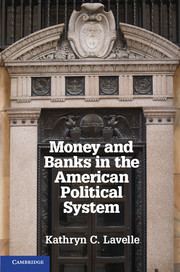Book contents
- Frontmatter
- Contents
- Figures and Tables
- Preface
- Acknowledgments
- Abbreviations
- 1 The Institutional Foundations of Financial Politics in the United States
- Section 1 A Historical Background
- Section 2 Bureaucratic Politics and Finance
- Section 3 The Operation of the Financial Political Economy
- Section 4 Conclusions
- Glossary
- References
- Index
- References
1 - The Institutional Foundations of Financial Politics in the United States
Published online by Cambridge University Press: 05 January 2013
- Frontmatter
- Contents
- Figures and Tables
- Preface
- Acknowledgments
- Abbreviations
- 1 The Institutional Foundations of Financial Politics in the United States
- Section 1 A Historical Background
- Section 2 Bureaucratic Politics and Finance
- Section 3 The Operation of the Financial Political Economy
- Section 4 Conclusions
- Glossary
- References
- Index
- References
Summary
As the financial crisis of 2008 wound down, economist Willem Buiter quipped, “self-regulation is to regulation as self-importance is to importance.” We know intuitively that they are not the same thing. Buiter goes on to comment that if a large corporation such as Airbus or Boeing wants to double its operations, it would need four or five years to assemble the money, build the factories, and ramp up its business. However, a bank can double, triple, or even quadruple its operations with incredible speed under the right circumstances of optimism, trust, and confidence. Unlike a large manufacturing operation that needs a plant and inventory of parts, a bank borrows and re-lends money to increase its operations without the same need for physical infrastructure. The problem is that the speed works in reverse. In the absence of the large fixed costs associated with plants and heavy machinery maintenance, pessimism, mistrust, lack of confidence, and fear or panic can force banks to shrink their operations at an even faster rate than they grow. Given the centrality of the banking system to economic activity and this unique feature of its operations, the industry cannot be left to police its own activities.
Policing the activities of banks poses a unique set of problems in the United States. By world standards, American political culture contains a very antigovernment streak. The early patriots resented taxation by the British parliament. Unlike many constitutions that detail a role for government, the Bill of Rights in the American Constitution is a list of things the government cannot do. The political activities of banks and financial institutions are no exception to this rule. Like the rest of American business, they seek the freedom to conduct their affairs with a minimal amount of government intervention to maximize their profits. The problem is that the failure of a large bank has very different societal effects than the failure of other firms. The entire U.S. economy is dependent on the banking system for money, credit, and a way to make payments. Therefore, it has been compared to the trunk of a tree that feeds the branches and leaves of the broader capitalist system. The loss of a branch or leaves might do serious damage, but the loss of the trunk kills the tree.
- Type
- Chapter
- Information
- Money and Banks in the American Political System , pp. 1 - 30Publisher: Cambridge University PressPrint publication year: 2013



